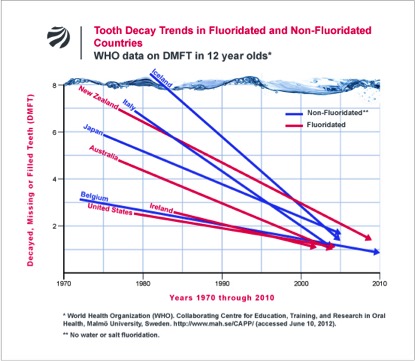Content Sections
A newly released Cochrane review concludes that there is little or no high quality evidence suggesting that water fluoridation reduces tooth decay in children. This general view loosely supports our own view, that of the Fluoride Action Network, National Pure Water Association and numerous other organisations and individuals who have long opposed fluoridation of the drinking water supply.
Professor Anne-Marie Glenny, from the School of Dentistry at the University of Manchester, headed the review.
The stand-out findings of the review are as follows:
- 97% of the 155 studies (from Europe, North America, South America, Australia and Asia) that met the review criteria were considered to be at high risk of bias (in either direction). Of these, only 20 were specific to effects on dental caries, the other 135 related to the side effect, dental fluorosis
- All studies were found to be at high risk of confounding, where any effects of fluoride from mass fluoridation of drinking water could not be separated from other factors such as sugar consumption, dietary habits, socio-economic status, ethnicity and use of either fluoride sources (e.g. rinses, gels, varnishes, floss)
- No studies were found that met the inclusion criteria that evaluated the effect of water fluoridation on tooth decay in adults
- While 20 pre-1975 studies on the effects of water fluoridation on tooth decay in children met the inclusion criteria, the reviewers had little confidence in their results owing to high risk of bias
- The above-mentioned studies were considered potentially irrelevant because current lifestyles commonly include use of other fluoride-containing products such as rinses, gels and varnishes
- The 135 studies relating to water fluoridation and dental fluorosis showed that even at the even at the lower end of recommended fluoridation (0.7 ppm), on average 12% of children would exhibit symptoms of dental fluorosis
- The authors found no available evidence to indicate what effect stopping water fluoridation would have on tooth decay rates, despite evidence elsewhere that suggests that when fluoridation in Germany, Finland, Canada and Cuba were stopped, tooth decay rates continued to decline
- Tooth decay rates are associated with socio-economic status: poorer communities generally have higher rates of decay
Bottom line
Tooth decay is a big issue for children and adults alike. However, the Cochrane review confirms that the decisions made in the 25 countries around the world (including the UK, Ireland, USA and Australia) to mass fluoridate the drinking water supply, have been made on science that is biased, confounded by other factors and no longer relevant because of the introduction of other fluoride sources. Contrary to what many have been led to believe, there is no scientific evidence of any reasonable quality that supports the use of drinking water fluoridation to decrease rates of tooth decay in adults, the life stage in which we spend on average around 80% of our lives.
With no conclusive evidence of benefit, a definite and predictable risk is incurred (dental fluorosis), the risk being dose dependent. As is so often the case, the authors of the Cochrane review play down this risk, considering it simply a cosmetic effect. However, since fluorosis is caused by the demineralisation of both teeth and bones, its effects on bone health cannot be ignored even when dental fluorosis levels are low to moderate. The authors do acknowledge the role of high exposure to fluoride being related to skeletal fluorosis and there are inadequate high quality studies available to establish the effects of combined exposures from drinking water and other fluoride sources applied topically.

Tooth decay rates according to the World Health Organization have been falling in both fluoridated and non-fluoridated countries (Source: Fluoride Action Network [http://fluoridealert.org/articles/50-reasons/])
Given that the prime effects of fluoride when consumed in drinking water occur topically during the time the fluoridated water is in the mouth — and not from its systemic effects on the body — one cannot separate fluoride as used in drinking water from additional exposures in oral care products. Yet governments are consistently reliant on irrelevant (and biased) data originating from before the mid-1970s when fluoride toothpastes and mouthwashes were introduced.
Also, from a risk perspective, total exposure from all sources should be considered. Apart from the ample evidence of risk of dental fluorosis, there is additional evidence for potentially increased risk of bone fractures and cancer. These and other health effects caused by mass fluoridation are often regarded as inconclusive because the available studies are subject to biases or confounding.
Stop fluoridation now!
In the UK, about 15% of the public drinking water supply is currently fluoridated, affecting some 6 million people. The Councils in Hull and Bedford are presently contemplating fluoridation of their municipal water.
The Cochrane review provides clear evidence for an absence of proven benefit and likely risk, therefore it should be a significant tool to help sway municipalities against fluoridation.
In Ireland, over 70% of the water is fluoridated and the North South Survey of Children’s Oral Health in Ireland (2002) reveals that one in 3 Irish children are affected by dental fluorosis.
In the majority of Western Europe, mass fluoridation has not been sanctioned – or where it was initially introduced, it has been stopped. The risks are deemed to outweigh benefits and alternate approaches to reducing tooth decay with lower systemic exposure (e.g. good oral health, reduced sugar consumption, fluoridated toothpastes and mouthwashes) are considered both more effective and less risky.
Mass fluoridation of drinking water supplies should therefore be banned globally because:
- It hasn’t been proven to reduce tooth decay
- Even evidence from old and now irrelevant studies suggest the beneficial effects (reducing tooth decay) may be limited to young children who are also the most vulnerable to adverse effects
- It is not possible to easily control the dose owing to great variations in water consumption by individuals
- Fluoride is an unlicensed drug, use of which is technically illegal
- Mass fluoridation contravenes our fundamental right to consume unadulterated water and food
- There are undisputed and other proven ways of reducing tooth decay, such as reducing sugar intake and improved oral hygiene
- Communities with lower socio-economic status are more prone to tooth decay and less able to pay for filtration technologies that remove fluoride from their water. Their health status may also make them more vulnerable to the side effects of fluoride
Please forward this article to any contacts you have in fluoridated areas. Please make elected representatives aware of the Cochrane Collaboration review and help them to understand why mass fluoridation of drinking water serves no public health benefit and should be stopped as a matter of urgency.
>>> Find out more about the risk to health from water fluoridation:
- Speaking Naturally with holistic dentist Dr Elmar Jung
- Coming to a tap near you








Comments
your voice counts
09 July 2015 at 8:06 am
The forced-fluoridation fanatics often try to claim that the low rates of dental caries in western European countries which do not have artificial water fluoridation are due to naturally occurring fluoride in water, or some other kind of artificial fluoridation such as salt fluoridation. They are lying.
http://forcedfluoridationfreedomfighters.com/scotland-and-the-netherlands-inconvenient-examples/
By the way, it's Fluoride Action Network, not Fluoridation Action Network.
10 July 2015 at 5:21 pm
The Department of Health, Public Health England, the British Dental Association and the British Fluoridation Society are not amenable to persuasion that fluoride does not prevent dental decay when taken internally, despite the growing body of evidence in the last 10 years. So, could it be that there is another driver which is powering water fluoridation? My guess is that money is the driver. It's expensive to convert hazardous waste into harmless waste and this is particularly true of hydrofluorosilicic acid with its 28 contaminants. Consultancies spend their waking hours dreaming up ways of dodging the environmental legislation which is designed to keep hazardous waste from getting into our seas and rivers. And dodge they most certainly do! The fluoridating acid travels over the sea from Belgium to North Lincolnshire from where it's transported to the fluoridating water companies. After fluoride is added, 96% of the fluoridated water goes down the drain with a further 2% of it going through our bodies and out the other end. Thus 98% of the added fluoride ends up in the sewers, rivers, estuaries and ...... sea! Our drinking water infrastructure and water company customers are being used as a cheap form of hazardous waste disposal. The producers of the hazardous waste do not have to spend money (and are paid for the acid) and the UK Government is complicit in allowing the hazardous waste to pollute our rivers. How on earth are we to get this message across to the UK Government?
29 November 2015 at 2:32 pm
Stop fluoridation now
Your voice counts
We welcome your comments and are very interested in your point of view, but we ask that you keep them relevant to the article, that they be civil and without commercial links. All comments are moderated prior to being published. We reserve the right to edit or not publish comments that we consider abusive or offensive.
There is extra content here from a third party provider. You will be unable to see this content unless you agree to allow Content Cookies. Cookie Preferences